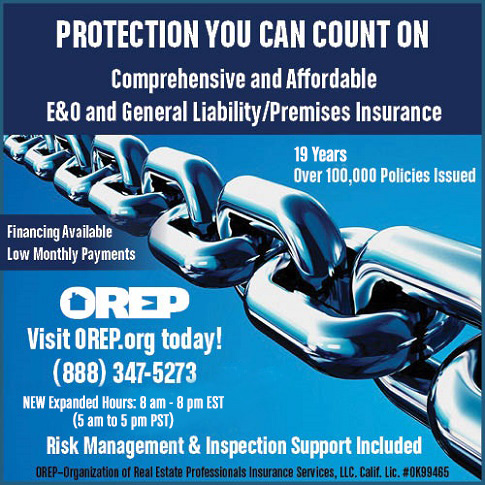 |
> E&O/GL Insurance for Home Inspectors Competitive Rates, Broad Coverage, Free Risk Management, online inspection support for tough questions, discounts on education and more... Professional Coverage, Competitive Pricing Shop OREP today! |
>> Editor’s Note: To help you stay up-to-date and connected, OREP/Working RE has established a Coronavirus (COVID-19) Discussion and Resource Page where you can share your thoughts, experiences, advice and challenges with fellow inspectors. See what Inspectors are saying here!
>> Take the Coronavirus: National Home Inspector’s Survey. Provide your industry feedback.
What Is FHA MPS and Why Should Home Inspectors Care?
by Catherine Hall, NAFHAC
Have you ever had this happen…?
• A home buyer calls you complaining that your inspection was not “correct” or accurate?
• A real estate agent questions why the appraisal flagged items in the home that were not mentioned in your inspection report?
• A loan officer insists that you “change the report” because some of your comments were creating a problem in underwriting?
The reason these unpleasant situations occur can be summed up in six letters: FHA MPS.
As home inspectors, we evaluate a property according to standards of practice dictated by our state or the association of which we are a member. These guidelines are designed to ensure the information provided by the home inspector is accurate, comprehensive, but reasonable, and within specific boundaries. These standards are there to protect the home inspector as much as they are the customer and apply no matter what type of financing is being used to purchase the home. For some buyers, our inspection report is not the only evaluation hurdle they must jump over.
Homebuyers looking to finance a home purchase with Federal Housing Administration (FHA) Insured loan are sometimes surprised to find that they are not allowed to purchase a particular property because it doesn’t meet FHA requirements. Their surprise may turn to dissatisfaction with the home inspector due to a misunderstanding of the purpose and content of the report they paid for. These “other” requirements are called the FHA Minimum Property Standards (MPS).
FHA created the Minimum Property Standard requirements into order to protect their investment in the property as they are insuring the mortgage. By extension, the MPS are also used to protect the lender. As you know, when a homebuyer takes out a mortgage, the property serves as collateral for the loan. If the homeowner defaults on the loan and the lender is required to foreclose and take back the property, they will want a property with the fewest safety or soundness concerns as possible. The resale of the home will, in most cases, be a loss to the lender and an insurance claim to FHA. While the mortgage company cannot ensure the property will remain in safe and sound condition, at least if the loan starts that way, the lender has at least limited their risk of loss.
Since FHA is providing insurance protection to the lender for the mortgage, FHA also has a vested interest that the home, if foreclosed upon, will be able to be resold for the highest possible price—as close to the original investment as possible.

At the same time, this requirement also protects the homebuyer. When they purchase a property that meets MPS, it is less likely that they will be burdened with costly home repair bills and maintenance from the start.
Properties being purchased with FHA loans must meet safety, security, and soundness standards. According to the U.S. Department of Housing and Urban Development (HUD), FHA requires that all properties financed with loans that they insure must meet MPS. The three classifications of these standards are:
• Safety: The system and components of the home do not pose a risk to the health and safety of the occupants.
• Security: The property has adequate security features to protect the dwelling.
• Soundness: The property has no physical defects, conditions or components that would negatively affect its structure or required mechanical operations

Typical areas included in a standard home inspection like roofs, electrical, plumbing and heating are evaluated according to these requirements. However, the MPS also includes requirements for conditions not covered by a typical home inspection report such as property access, excess noise, and unfavorable site location. These can be some of the differences that can cause the misunderstanding on the part of the buyer who looks at the home inspection report as a “complete” description of “all” defects in the home—you know they do!
As we all know, in order for a property to receive underwriting approval, it must be evaluated by an appraiser—in this case an FHA Appraiser. For a typical single-family home, the appraiser will complete a form called the Uniform Residential Appraisal Report. In this report, the appraiser will make his assessment of the type, size, and composition of the dwelling as well as the property. They will also evaluate the home to determine if the systems and components meet or do not meet the FHA MPS. (Note: an important element of the FHA Appraisal is that ALL utilities must be on at the time of the assessment.) They will make an opinion as to the three conditions above and report their recommendations for correction to the underwriter. This leaves a lot of room for interpretation particularly based on the word “MINIMUM”.
The interpretation of this term “Minimum Property Standards” can also cause a situation that can create a roadblock to closing. It can occur when as home inspectors, we report conditions and system as “Marginal” based on appearance, age, or indications of limited life expectancy. Something that is not common knowledge is the fact that the appraiser does NOT make the determination if a home is or is not eligible for the mortgage- it is the underwriter who makes this decision based on the information from the appraisal report, home inspection report and all other pertinent facts.
It is important to know that FHA does not consider as an MPS failure cosmetic or minor defects, deferred maintenance, age beyond manufacturer life expectancy or normal wear if these conditions do not affect the imminent safety, security, or soundness of the home. FHA like everything in life, changes its standards and has evolved with the increased sophistication of the homebuying public. Many home inspectors have heard that certain conditions were automatic appraisal failures, but these are no longer the case. Examples of items that once did but no longer require correction include:
• Missing handrails
• Cracked or damaged exit doors that are otherwise operable
• Cracked window glass that does not impair function or cause a safety concern
• Chipping, peeling, spalling painted surfaces in homes built after 1978 (limited risk of lead paint hazards built after this time)
• Minor plumbing leaks (such as dripping faucets)
• Defective floor finishes or coverings (worn through the finish, badly soiled carpeting)
• Indications of past (non-active) wood-destroying insect/organism damage that did not cause structural damage
• Rotten or worn-out countertops
• Minor/non-structural damage to finished wall/ceiling surfaces: plaster, sheetrock in post-1978 homes
• Poor workmanship
• Upheaved, cracked sidewalks
• Crawl spaces with debris and trash
• Lack of an all-weather driveway surface (unpaved driveways are no longer a deficiency in most cases)
Looking at this list, it is easy to see that if an underwriter were to get a copy of a home inspection report describing the kitchen sink drain as “unsatisfactory” due to a leak in the trap, they might interpret this as requiring repair as a measure of mitigating their risk. This is why you may get a call from a loan officer upset that your report is so “negative” or vague. (HINT: We recommend to all our home buyers and real estate partners to NEVER show the inspection report to the lender. You might want to as well).
(story continues below)

› Compare the cost of E&O in 5 min.
(story continues)
Why does this cause such a problem for the home buyer…and by extension us as home inspectors?
When a property fails to meet MPS, as described by the FHA appraisal report, the home cannot be purchased with the FHA insured loan without the issues being corrected. The homebuyer is left with the frightening prospect of their “deal dying”. When this happens, the homebuyer and their agent, looking to blame someone—anyone—will turn to the home inspector and find them at fault for either NOT providing enough information or TOO MUCH!
Remedies for Properties Below Minimum Standards
One of the ways the obstacle to buying the home can be removed is by having the seller make repairs themselves before selling the property. In most situations the buyer will ask the seller to make the corrections listed on the appraisal report. However, in this current “sellers’ market”, many sellers simply do not have to do these repairs. In many cases today, they are confident that there are enough other prospective buyers who will be eligible without the seller fixing anything. In fact, many sellers will state “conventional” financing only to completely avoid dealing with the FHA MPS.
Alternatively, buyers that can’t qualify for an FHA loan due to the condition of the property based on the appraisal, may use another loan product, such as an FHA 203(k) loan, which allows the purchase of a home that has significant problems. With the 203(k), all MPS repairs as well as desired upgrades and improvements are completed after closing using funds that are added to the purchase price to cover these expenses.
If the property is bank owned, there is usually no way to get the repairs completed except with a rehab loan. In this case, the deal will most likely die if an alternative way to get the repairs completed cannot be found.
This can be a very discouraging and expensive situation for the FHA homebuyer who now will have to renew their efforts to find a home that meets the Minimum Property Standards. This frustration can be compounded especially for buyers with limited funds and limited properties in their price range.
FHA loans were created to provide greater accessibility to homeownership for those who find it difficult or impossible to get a conventional mortgage, but FHA doesn’t guarantee to make it easier to buy a property. In fact, some homes simply will not qualify not because of any condition inside the dwelling but due to external/environment issues that can’t be changed or corrected by the seller.
Why should all this be of interest to home inspectors?
There is a great opportunity for home inspectors to be of even greater help to homebuyers as well as create a new revenue stream by providing information and reports specifically tailored to address FHA MPS issues. This will be a great help to FHA borrowers who want and need to know what to expect when home shopping. Having access to a service that gives “advance information”, home buyers can restrict their search to properties that are likely to meet FHA guidelines, or at least avoid spending money on an appraisal report that may not pass or be ineligible for the FHA Insurable Loan.
Additionally, those home inspectors who are FHA 203k certified or are “partnered” with a 203k consultant, can many times “save” the deal that might otherwise die due to property conditions and or seller’s inability or unwillingness to make repairs. The possibilities that exist for home buyers and home inspectors with FHA Rehab Loans are exciting but that is a topic for another day.
Consider adding a very simple question to your pre-scheduling order taking: “How are you financing your new home?” FHA/VA/Conventional? You may be surprised how many of your customers are using FHA loans and would benefit from any extra support you can give them to help avoid heartbreak and frustration (and the blame game) later on.
About the Author
Catherine Hall is the Executive Director of the National Association of FHA Consultants and known throughout the residential building industry as America’s 203k Queen. Having owned and operated a successful multi-inspector firm for 26 years, she developed and maintained her company’s profitability with the unique selling point of being experts in all things related to government-insured or sponsored home ownership. You can learn more about FHA mortgages and the products and services available to home inspectors in this lucrative area at NAFHAC.org.
OREP/WRE Coronavirus Discussion and Resource Page
Coronavirus: National Home Inspector Survey
Free Risk Management Online Course Claims and Complaints: How to Stay Out of Trouble
Available Now
Presenter: David Brauner, Senior Insurance Broker OREP
David Brauner, Senior Broker at OREP, shares insights and advice gained over 25+ years of providing E&O insurance for inspectors, showing you how to protect yourself and your business. Watch Now!
Note: The Summer 2021 issue of Working RE Home Inspector is mailing now to over 25,000 home inspectors nationwide. OREP Insureds enjoy guaranteed delivery of each print magazine and many more benefits.

